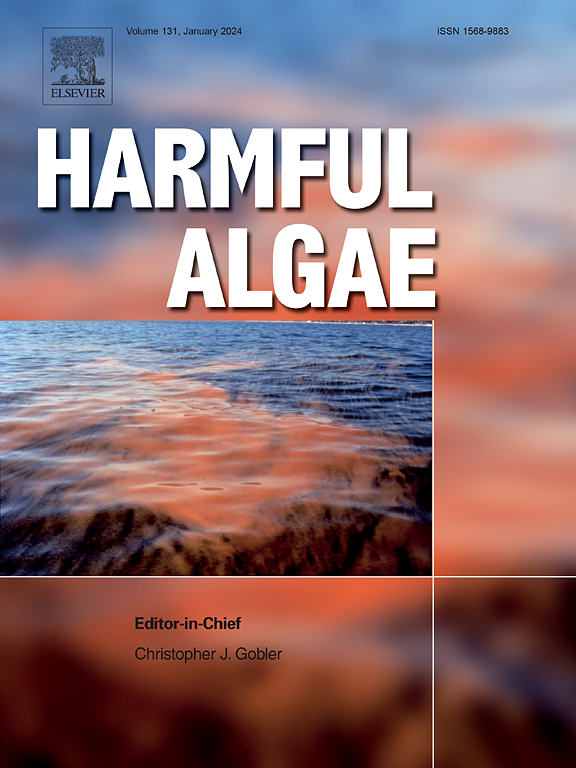Dolichospermum 的异囊分化对不同形式缺氮的反应
IF 5.5
1区 生物学
Q1 MARINE & FRESHWATER BIOLOGY
引用次数: 0
摘要
近年来,旨在缓解富营养化的措施已成功降低了中国许多湖泊的氮磷浓度。值得注意的是,对总氮水平的管理促使造成有害藻华的优势种属发生了变化。其中,Dolichospermum 是一种典型的重氮蓝藻,具有在氮限制条件下分化出异囊进行大气 N2 固定的能力。然而,人们对驱动异囊分化以应对特定氮化合物缺失的内在机制仍然知之甚少。本研究利用 2022 年 1 月至 6 月期间收集的巢湖实地数据,分析了影响异囊频率的驱动因素。此外,还利用 NH4Cl、NaNO3 和尿素作为氮源,进行了特定缺氮条件下的实验,以研究在这些条件下多壳菌的响应机制。结果表明,巢湖中异囊频率的月度变化很大,这与多种驱动因素的相互作用有关。养分变化是最直观的驱动因素,异囊频率与总氮和溶解总氮水平呈显著负相关。实验结果表明,NO3N 的缺失会促进 Dolichospermum 的生物量和异囊频率。当限制 NH4N 时,Dolichospermum 的增殖受到抑制,导致异囊发育期延长。虽然缺乏尿素最终会增加多利西伯菌的异囊频率,但生物量并没有显著增加。三种氮源的浓度与异囊分化呈负相关,NO3N 和尿素缺乏对异囊分化的影响明显强于 NH4N。此外,异囊分化频率与光合效率呈正相关,这表明异囊和无性细胞之间光合能量的获取和分配也在一定程度上影响着异囊的分化过程。研究结果突显了异囊分化对各种形式氮的不同反应,强调了在养分控制中优先去除 NH4N 的重要性。不过,还需要进一步研究,以确定引发异囊分化的不同氮源的关键阈值浓度。本文章由计算机程序翻译,如有差异,请以英文原文为准。
Response of heterocyst differentiation of Dolichospermum to different forms of nitrogen deficiency
In recent years, initiatives aimed at mitigating eutrophication have successfully reduced nitrogen and phosphorus concentrations in numerous lakes across China. Notably, the management of total nitrogen levels has prompted a shift in the dominant genera responsible for harmful algal blooms. Among these, Dolichospermum, a typical diazotrophic cyanobacterium, exhibits the ability to differentiate heterocysts for atmospheric N2 fixation under nitrogen-limited conditions. However, the underlying mechanisms driving heterocyst differentiation in response to the absence of specific nitrogen compounds remain poorly understood. This study analyzed the driving factors influencing heterocyst frequency using field data from Lake Chaohu collected between January and June 2022. Furthermore, an experiment was conducted utilizing NH4Cl, NaNO3 and urea as nitrogen sources, with specific nitrogen deficiencies created to investigate the response mechanisms of Dolichospermum under these conditions. The results indicated significant monthly variations in heterocyst frequency in Lake Chaohu, which were associated with the interaction of multiple driving factors. Nutrient changes emerged as the most intuitive driving factor, with heterocyst frequency showing a significant negative correlation with total nitrogen and dissolved total nitrogen levels. Experimental results demonstrated that the absence of NO3![]() N promoted both the biomass and heterocyst frequency of Dolichospermum. When NH4
N promoted both the biomass and heterocyst frequency of Dolichospermum. When NH4![]() N was limited, the proliferation of Dolichospermum was inhibited, leading to an extended period of heterocyst development. Although a lack of urea eventually increased heterocyst frequency in Dolichospermum, there was no significant increase in biomass. The concentrations of the three nitrogen sources exhibited a negative correlation with heterocyst differentiation, with the effects of NO3
N was limited, the proliferation of Dolichospermum was inhibited, leading to an extended period of heterocyst development. Although a lack of urea eventually increased heterocyst frequency in Dolichospermum, there was no significant increase in biomass. The concentrations of the three nitrogen sources exhibited a negative correlation with heterocyst differentiation, with the effects of NO3![]() N and urea deficiency on heterocyst differentiation being significantly stronger than those of NH4
N and urea deficiency on heterocyst differentiation being significantly stronger than those of NH4![]() N. Moreover, heterocyst differentiation frequency was positively correlated with photosynthetic efficiency, which indicated that the acquisition and distribution of photosynthetic energy between heterocysts and vegetative cells also influence the differentiation process of heterocysts to some extent. The findings highlight the differing responses of heterocyst differentiation to various forms of nitrogen, emphasizing the importance of prioritizing NH4
N. Moreover, heterocyst differentiation frequency was positively correlated with photosynthetic efficiency, which indicated that the acquisition and distribution of photosynthetic energy between heterocysts and vegetative cells also influence the differentiation process of heterocysts to some extent. The findings highlight the differing responses of heterocyst differentiation to various forms of nitrogen, emphasizing the importance of prioritizing NH4![]() N removal in nutrient control. However, further research is needed to determine the key threshold concentrations of different nitrogen sources that trigger heterocyst differentiation.
N removal in nutrient control. However, further research is needed to determine the key threshold concentrations of different nitrogen sources that trigger heterocyst differentiation.
求助全文
通过发布文献求助,成功后即可免费获取论文全文。
去求助
来源期刊

Harmful Algae
生物-海洋与淡水生物学
CiteScore
12.50
自引率
15.20%
发文量
122
审稿时长
7.5 months
期刊介绍:
This journal provides a forum to promote knowledge of harmful microalgae and macroalgae, including cyanobacteria, as well as monitoring, management and control of these organisms.
 求助内容:
求助内容: 应助结果提醒方式:
应助结果提醒方式:


